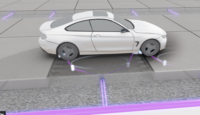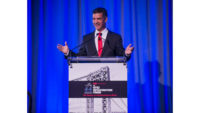The city of Columbus, Ohio, is well underway with its pilot projects for mobility after receiving a $40-million grant from the U.S. Dept. of Transportation in 2016 as part of a Smart Cities challenge. Engineers from traditional construction and infrastructure backgrounds say the program exemplifies how their jobs are evolving to respond to disruptive technologies.
Columbus also received $10 million from Vulcan Inc., the Seattle-based investment firm led by Microsoft co-founder Paul Allen, to promote electric vehicles and grid modernization, among other goals.
The Columbus Partnership, a nonprofit organization made up of 75 CEOs of private-sector employers, also committed $90 million to fund the Smart City efforts.
Projects include a Mobility As A Service (MAAS) app and on-demand transit service for pregnant women in the underserved community of Linden, where the infant mortality rate is four times the national average. The city is installing a bus rapid-transit system, mobility kiosks, motion-sensitive LED street lights, self-driving shuttles, visitor’s center and connected-vehicle technology.
Smart Columbus is also working on an app that customizes transit services for people with disabilities or dementia, and an open-source data management platform, says Jordan Davis, director of Smart Columbus for the Columbus Partnership. Work has begun on Smart Mobility Hubs at six locations, which involve interactive digital kiosks that provide access to Wi-Fi, emergency calling, social services, maps and a comprehensive trip-planning and payment service.
“All projects will be off the ground by June next year,” Davis says. “They will be evaluated for a year.”
The program is indicative of how infrastructure engineers and contractors must do business now. “It’s a learning experience for us without a doubt,” says Andy Wolpert, deputy program manager. “Software developers, coders, application developers, IT professionals—we are working with them on a daily basis.”
Mandy Bishop, Smart Columbus program manager, adds that civil engineering curricula must go beyond traditional topics such as paving and geotechnical engineering. “You have to have a new lexicon and know IT to deliver system-based projects,” she says.
The U.S. DOT grant funded the data management platform backbone, MAAS app and the prenatal trip assistance pilot, Wolpert says.
The Vulcan grant funded a ride-and-share electric vehicle program that garnered over 11,000 rides and propelled adoption of electric vehicles by 2.3%, Wolpert says.






Post a comment to this article
Report Abusive Comment